Will there be a mosque in Lviv?
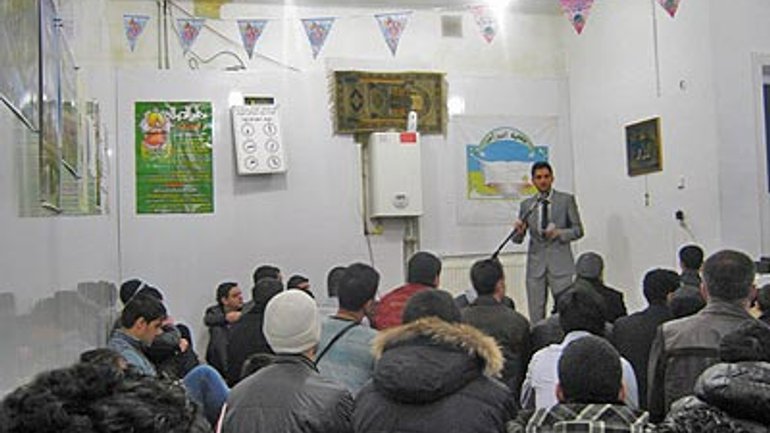
Muslims in Lviv have refused to build a mosque on the place of a large ditch, but are not looking for another place.
Over the past 14 years Muslims in Lviv have been asking the government to allocate them land for a mosque. Not getting the desired result, for 6 years now they haven’t submitted any requests. Will the Muslim community of Lviv defend their right for a mosque, where do they pray now, and why don’t they appeal to the authorities?
The city has three Muslim communities that gather in private residences or in rented spaces. They differ both in nationality and in denomination of Islam. Among them are natives of Tatarstan, Lebanon, Syria, Saudi Arabia, Russia, and Kazan, as well as Crimean Tatars, most of whom came to Lviv in 1991. The most volatile in terms of number of confessors of Islam is Arabic students. One group of them is made up of Azerbaijanis. “About a thousand Muslims live in the city,” says Sidraus Nuriyev, the imam of one of the Islamic communities in Lviv. “No one knows exactly how many of us there are because some leave while others arrive.” Sidraus, originally from Tatarstan, served as a military officer in Russia and Hungary, then came to Kyiv, where he married. Thirty years ago he moved to Lviv with his family. A pensioner, he now deals with the issues of the religious community, which does not have a stable place for worship.
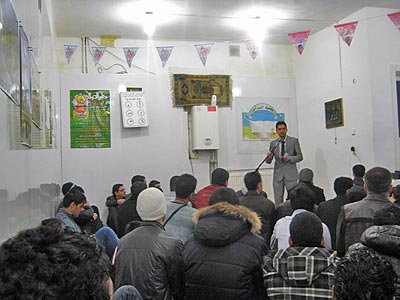
Not all Muslim communities of Lviv have the same “homeless” fate. One of the communities meets in an apartment on Pid Dubom Street, the other on nearby Chornovila Avenue, and another, on the premises of the Arabic NGO En-Nebras on Mechnikova Street. According student Rafik Huma, often one group doesn’t know about the existence of the others.
This can be explained by the denominational differences of Islam. In Ukraine there are representatives of two denominations of Islam – Sunni and Shia. Within Sunni there is Habashism. As this branch practices religious fundamentalism, it has many Muslim opponents. According to Arab student Rafik Huma, in Lviv there are about five Habashis who gather near the Polytechnic. Most Muslims deny there is a division according to denomination. Sidraus Nureyev is convinced that only those who benefit from the divide in Islam talk about it. “Everyone goes to pray to the community to which he is closer,” believes Turku, a representative of another Muslim community, who has lived in Lviv for four years. “I belong to the Sunnis, although I don’t recognize any separation between the religious communities – it does not matter whether you are Sunni or Shiite.”
Instead of a Mosque
But the Lviv Muslims have different opinions about the construction of a mosque in Lviv. None of them denies that Lviv needs a mosque. Only the religious organization called The Muslim Community of Lviv, however, has sought to obtain land from the authorities.
In 1993 this community, then led by Imam Nadiula Izhberdyeyev (now deceased) and now by Hamzu Kashayev, initiated an appeal to the City Council about a mosque. Other communities joined in words, but not with their own requests. Hamzu Kashayev says that now there are 150 Muslims in his community, among which only 30 are active. They do not have their own space, and for prayers they go to the office of the organization En-Nebras. Judging by the fact that only up to 50 people gather in the space, not all attend the prayers.
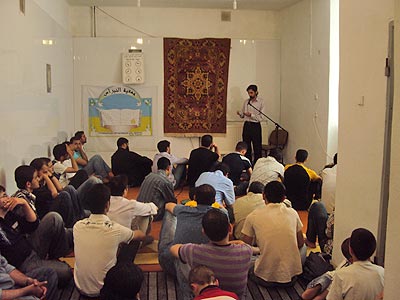
Rafik Huma, who calls himself a missionary, works some shifts in the office of En-Nebras. He combines his missionary work with studies at the Lviv Polytechnic. “En-Nebras operates in Ukraine since 1996,” says Rafik. “We hold prayers and free Arabic lessons in our office.” Upon entering the room, the floor is covered with soft rugs and one can feel the spirit of another religion: inscriptions in Arabic letters loom on the door, and on the walls of the spacious room hang posters with prayers, historical schemes of the emergence of Islam and its spread in Ukraine. Newspapers and religious books are stacked on shelves in the side room – the library. Everyone who wants to learn more about Islam and its history can come here. In the main room hangs a schematic clock with the schedule of Salat – the prayers, which devoted Muslims must practice five times a day. Besides prayer, there is a joint prayer service that the community holds in the office on Friday evenings.
Furthermore, halal meals – meat without blood – are brought here. According to Islamic tradition, pork and meat with blood are impure so Muslims eat chicken and halal food. “In processing meat we constantly repeat the name of Allah, and thus the food is freed from bacteria,” says Rafik. “Soon in Lviv there will be a halal store because there is a man who wants to produce halal food, and before this our supplier was Nasha Ryaba (a Ukrainian food company).
Near the entrance to the office of the organization is a group of Arab men. According to one of them, Jamil, who graduated from university and works as a physician, the lack of a mosque does not affect the profession of faith. Although, he says, if there were one, it would help bring the people together. Klaiman, originally from Lebanon, came to Lviv to study. He also admits that he does not have any obstacles in worshiping Allah, and that a mosque would not deepen his faith. “If you're a Muslim, you will pray to Allah no matter where you are – at home or in a mosque,” adds Miteb Mutala, a student at the Danylo Halytsky Lviv National Medical University.
A 20-Year-Old Question
Perhaps for Arab students who will return to their countries when they graduate it is not so important where they worship – in a mosque or a private apartment. That is not necessarily the case for the Muslims who have lived for years in Lviv and have no mosque or permanent location for holding prayers. Such Muslims belong to the community of Imam Sidraus Nureyev, which is constantly changing locations, and the community of Hamzu Kashayev, which must make do in the walls of En-Nebras. The leaders of the Muslim communities in Lviv have changed over the years, but the hope to build a mosque in the city has not left for decades. Today, this process has frozen in place.
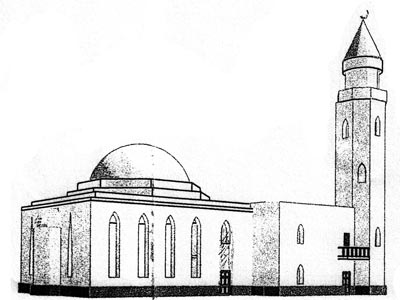
The community submitted the first requests for land in 1993. “We developed a draft for the mosque and paid the fees for the preparation of documents, but we were constantly denied,” says Sidraus, who is a bit offended by the situation. “At first the City Council allocated land on Lypynskoho Street, but later they told us that the site was sold to a Polish-Ukrainian enterprise.” The next one, he said, was a land plot on Chyhyrynska Street, where the Poltva River flows. However, it turned out that this zone crosses the “red line” where construction is prohibited. Then there was talk about some land near the High Castle, where once Tatars lived, and where during the times of Danylo Halytskyi there may have stood a mosque. “In our last attempt we turned to the government sometime in 2007, and then we were offered land in on the Hlynyanskyi Tract where there is a large ditch,” said Sidraus. “Well, tell me, is this not cruel?”
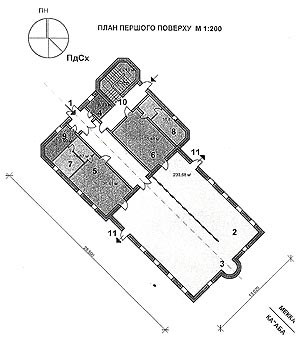
Sidraus is well aware of the situation, but he still hasn’t received any decisions regarding a land plot or building project. Earlier, he was only a passive observer of the actions of Nadiula Izhberdyeyev, after whose death all documentation was passed to the new head of the community Hamzu Kashayev. After talking with him, another reason for the refusal to build a mosque on the designated area became clear. “Nearby there is a distillery,” he says, “and in Islam it is forbidden to build a mosque in such a place because it is imbued with negative energy.” The government buries its head in the sand and does not want to understand the needs of different cultural traditions, he said. “We are tired of getting no results,” complains Hamzu, “and therefore we have stopped making requests to the authorities, but this is not the end.”
At the same time, Deputy Mayor for Humanitarian Affairs Vasyl Kosiv says the government is open to resolving such issues. “We receive a lot of requests for the allotment of land from religious communities,” says the official. “There is not always enough land, but we consider all requests, and as for the Muslim community, we haven’t received any requests in the last 6 years.”
When asked whether the Muslims will seek another land plot, Hamzu Kashayev said that he must consult with the whole community and that he must resolve a more pressing matter – acquiring additional territory for burying the dead in a cemetery in Briukhovychi. Sidraus said that as soon as there are favorable circumstances, he will be able to solve the problem. Turku will buy a land plot and build a mosque when there will be about two thousand Muslims in Lviv: “Then definitely we will buy land and build a mosque, but so far the need is not very great.” In the meantime, he has faith that after five or six years the community will be able to show off a huge mosque, which will bring all the Muslim communities of Lviv together under one roof.









